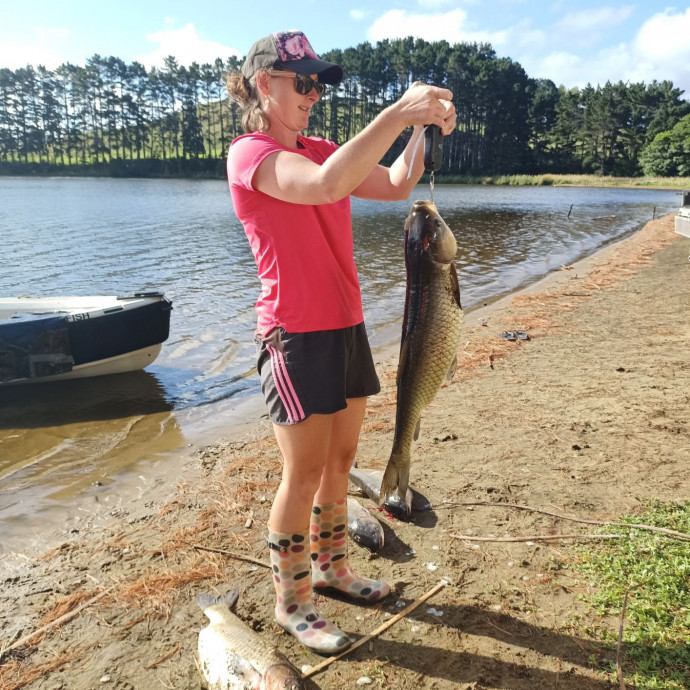Whangarei Girls’ High School - Rachel Drysdale

2021 | Ngā taonga o Te Tai Tokerau – our treasures of Northland
School: Whangarei Girls’ High School
Region: Northland
Host: Northland Regional Council
Participant school/Science department statement
Whangarei Girls’ High School science department believes that the whole school will benefit from participating in this programme as it will enable the school to develop a rich and engaging concept-based curriculum. They are in the process of reviewing their junior curriculum with a vision to make it more relevant, encourage student curiosity in their community and the science that happens locally. They aim to improve retention of Māori and Pasifika students into senior science subjects by students taking part in community projects, gaining knowledge and skills which would allow contextualisation of many science skills, in particular the Nature of Science.
Whangarei Girls’ High School is part of the Ngā kura tea ko o Whangarei Kāhui ako Group 1. One of their Kāhui Ako challenges is to improve student engagement through the STEAM approach. STEAM is the acronym of science, technology, engineering, arts and maths. Their challenge is to inspire students by giving them real life experiences of science and encouraging creative thinking and 21st century skills for the modern world.
The science department has a goal of developing a rich and engaging concept-based science curriculum with authentic contexts that are relevant to the Northland community. Rachel is the second teacher to participate in the Science Teaching and Leadership Programme following on from Suzanne Scourfield in 2020. The school is excited about the collaboration that this offers to the Science department. They believe that the whole school will benefit from Rachel participating in the Science Teaching Leadership Programme as it will grow links within their community, increase communication, understanding and accessibility between their community, local businesses, students and whanau within a science context. It will also encourage student curiosity into their community and provide local career pathways for students in Northland.
Rachel has 13 years secondary school teaching experience, specialising in Science and Biology. She is an enthusiastic teacher who is passionate about improving student engagement in Science as well as opening up further learning and career pathways for students.
Rachel has been hosted by Katrina Hansen at Northland Regional Council (NRC) in the Biodiversity Department. Her placement has involved estuary and shorebird surveys, eDNA sampling, removal of pest fish from Lake Swan in Pouto, collaboration with biodiversity and biosecurity specialists on education programmes and community groups within Northland and also Kauri dieback sampling. This range of science field work within Northland has given Rachel a comprehensive understanding of the key Nature of Science skills required for scientists and how scientists work. It has also provided her with a network of community scientists in Northland. One of the key attributes Rachel noticed about the scientists at NRC is their passion for the environment and in upskilling and educating the community to ensure kaitiakitanga of our taonga.
Highlights for Rachel during her placement were identification and counts of sea and shore birds at a range of locations in Northland and working with community groups within this setting. Detection of the rare Hochstetter’s frog in the Brynderwyns and the use of eDNA to determine species present in the area. Removal of 36 Grass Carp which had been used as a form of biocontrol from Lake Swan in Pouto.
The Science Teaching Leadership Programme has developed Rachel’s understanding of the Nature of Science and the Science Capabilities and her placement at NRC has seen the importance of these in practise. Alongside this, Rachel’s community connections with local scientists will allow for authentic place-based learning and citizenship science opportunities. The Leadership course at Otago University has enabled Rachel to be clear on her philosophy of leadership and equipped her with strategies to lead Science at her school.
Rachel is very grateful for this opportunity and would like to thank the team at NRC who shared their field work, time and expertise with her, especially Katrina Hansen. She would also like to thank the Royal Society Te Apārangi and Whangarei Girls’ High School for investing in her and her Science team for their support, enthusiasm and encouragement.
Toitū te whenua, Toitū te moana, Toitū te tangata.
If the land is well, If the sea is well, The people will thrive.
